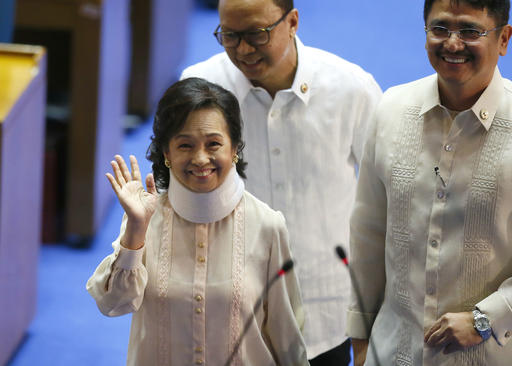Former President and now Pampanga Representative Gloria Macapagal-Arroyo on Monday said she trusted President Rodrigo Duterte to judiciously implement the “state of lawlessness” following the blast in Davao City’s Roxas Boulevard night market that claimed 14 lives.
READ: Bloody Friday in Davao
During a press briefing of the deputy speakers at the House of Representatives, Arroyo was asked about the lessons she could share with Duterte having declared a state of national emergency and martial law during her term as President.
Arroyo in 2009 declared martial law in Maguindanao in the aftermath of the Maguindanao massacre of 58 persons, 32 of whom were journalists, allegedly by the private army of the Ampatuan warlord clan.
She also declared a state of national emergency in 2006 claiming an alleged coup led by opposition and soldiers to overthrow her. Arroyo also declared a state of rebellion in 2001 when a mob protested the arrest of deposed President Joseph Estrada for plunder over jueteng kickbacks, and in 2003 due to the mutiny led by then Navy Ltsg. Antonio Trillanes in Oakwood, Makati.
READ: States of rebellion, emergency under Arroyo administration
Arroyo said Duterte knows full well the lessons of using such powers of the Chief Executive granted under the 1987 Constitution.
She said when she was president, Duterte was her adviser on peace and order and drugs due to his experience as mayor of Davao City.
Duterte had ruled the city with an iron fist, despite allegations of employing vigilante squads to rid the city of suspected drug pushers.
“President Duterte knows all the lessons, because he was helping me a lot during my time. He was my adviser on peace and order and drugs. He knows my experience, he knows all the lessons,” Arroyo said.
“You know, when I used to have those problems in Mindanao, I would ask Mayor Duterte to handle them for me. And he handled them very well in his time for me. So I’m sure he’ll handle just as well, if not better, for himself,” she added.
Arroyo said the declaration of state of lawlessness in times of terrorism was the right thing to do.
“Ginagawa ko ‘yan nung panahon ko kaya it’s the right thing to do. It varied. The threat is national so it’s just right that we should trust the President,” Arroyo said.
“Just recalling from my own experience, it varied. It varied according to the condition and I used to rely a lot on the judgment of the security officials. The state of lawlessness that I used to declare came from the provision in the Constitution that the president may call on the military to assist the police when there is a state of lawlessness. That means all the armed forces, both military and police, are on-call and being mobilized and they will be the ones—the intelligence community—to say the threat is over to the extent that the state of lawlessness can be lifted,” Arroyo added.
READ: What is state of lawless violence?
In declaring the state of lawlesness, Duterte called on the military to help the police in running the country and protect the citizenry due to the suspected involvement of the Abu Sayyaf bandit group in the blast. He also cited the drug situation and the spate of extrajudicial killings of drug suspects unfairly attributed to the police.
Duterte clarified that he is not declaring martial law and is not suspending the writ of habeus corpus.
According to Section 18 of Article VII of the Constitution that explains the powers of the executive, the president as commander-in-chief of all armed forces may call out if necessary “such armed forces to prevent or suppress lawless violence, invasion or rebellion.”
Asked about any possible abuses by the police and military due to the state of lawlesness, Arroyo said she did not experience any abuses by state forces when she was President.
“I did not experience their abuse, being abusive. I don’t think they will abuse it now,” Arroyo said.
When Arroyo declared a state of national emergency in 2006, police arrested Anakpawis Rep. Crispin Beltran and Bayan Muna Representative Josel Virador. Newspaper columnist and UP Professor Randy David and then Akbayan president Ronald Llamas were arrested after a dispersal of a rally. Anakpawis Representatives Satur Ocampo and Rafael Mariano, Bayan Muna Representative Teodoro Casino and Gabriela Representative Liza Maza evaded arrest. Police also raided the opposition papers Daily Tribune, Malaya, and Abante.
The Supreme Court later ruled as unconstitutional the warrantless arrests and raid of media outlets.
Arroyo admitted that Duterte, being a more firm and iron-fisted President than she was, would implement the state of lawlessness judiciously.
“President Duterte is much stronger leader than I am. If I could handle them, then he could handle them even better,” Arroyo said.
It was the first time for Arroyo as deputy speaker to lead the press conference since her release from four years of hospital detention after the Supreme Court dismissed her plunder case involving the alleged raid of public funds in the Philippines Charity Sweepstakes Office.
READ: Arroyo walks free after 4 yrs of hospital detention
The Supreme Court ruled that Arroyo’s approval of the P366-million intelligence fund releases was only ministerial and does not constitute an “overt act” to commit plunder. RAM/rga
READ: SC: Arroyo OK on fund release not ‘overt act’ of plunder
